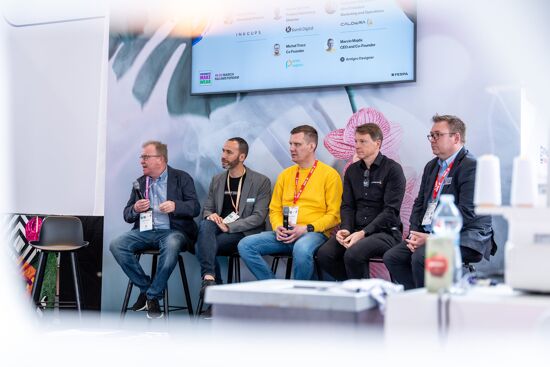Rapha a cycling brand for performance sportswear and the road to Digitisation

Founded by Simon Mottram in London in 2004, Rapha makes the world’s finest cycling clothing. For 15 years, their products have redefined comfort, performance, and style for cyclists from absolute beginners through to World Tour professionals.
We recently joined John Roberts and Carl Moriarty, on the FESPA podcast to discuss the success of the Rapha brand, its unique corporate culture and their passion for cycling, sportswear performance apparel, technology and digital print.
Born from a love of the sport, Rapha isn’t simply a cycling brand, it’s a community and regularly organises and sponsors unique rides and events. The Rapha Cycling Club was founded in 2015 to bring cyclists together, and today there are already more than 12,000 members worldwide.
With over 21 Clubhouses across Europe, North America and Asia which have become hubs for RCC members and local cyclists, offering a café space and stocking the latest products. This is a unique retailing concept, and one that gives back to the community.
Rapha is proud to have worked with the sport's best athletes from its earliest days. First, as title sponsor to the British UCI Continental team Rapha-Condor from 2005 to 2012, then as clothing supplier to Team Sky from 2012 to 2016. They continue to work at the top tiers of professional cycling with the women’s UCI World Tour team CANYON//SRAM since 2016, and, after publishing a two-year study on the state of the sport titled the Rapha Roadmap, they have returned to the men’s World Tour with EF Education First Pro Cycling from 2019.
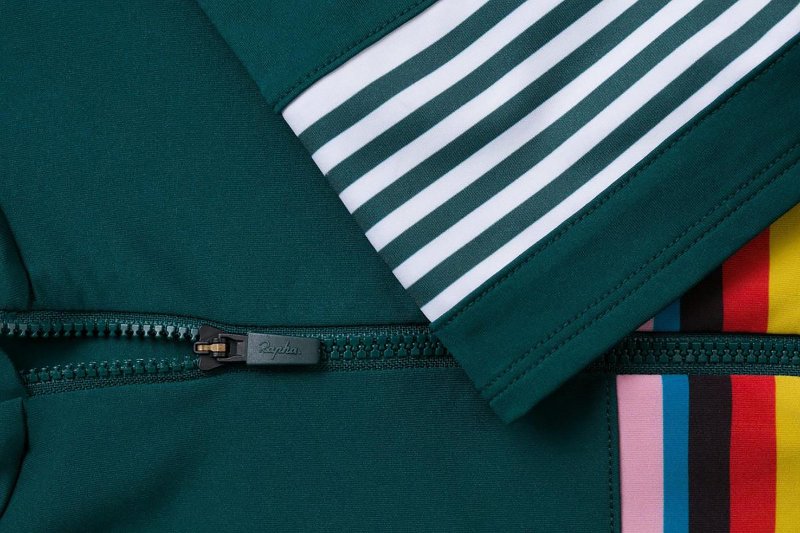
Caption: The primary focus has been on comfort, and the development of the core textiles utilised to enhance the thermo regulation of the rider in order to increase performance
This year, Rapha has launched two key new initiatives; the Custom programme which offers the chance for anyone to create completely customisable Rapha products using an innovative online design tool. And the Rapha Foundation which provides funding to not-for-profit organisations, with the mission of building a better future for the sport by inspiring, empowering and supporting the next generation of racers.
Carl Moriarty, Product Design Director and John Roberts, Head of Product are based in the London head office, and it is here that the design and development of all products is generated. Both are of course, keen cyclists, not a statutory requirement, but I’m sure it helps.
The brand mainly trades online, with very few wholesale activities, and began its journey with one simple Morino jersey, something that wasn’t available anywhere else. Rapha offers the cyclist specialist, performance clothing and accessories, something that in the early days (2004) were not readily available for the sport. This one item quickly grew into a small collection of products, and as the brand became established as did the company culture, which continues to thrive today.
The cycling industry has witnessed impressive growth, with no sign of slowing, currently the industry is worth between £6.5 and £7 billion pounds, split mainly to road cycling with just under a third of sales from Mountain biking. Rapha work hard to get the know their consumer and focus on a specific part of the marketplaces estimated to be worth £1 billion, where the highly engaged road cyclist source their products.
Cycling continues to be a thriving sport, as commuters choose to ride, instead of driving, cycling as well as a professional, competitive sport, has also become a lifestyle choice. The Olympics in 2012 also propelled the sport into public view and it has been gaining traction ever since. The success of cycling has brought new competitor to the market, and Rapha concentrate on their inherent cycling culture, and deep understanding of the sport, its specifications and dynamics to stay ahead of the curve.
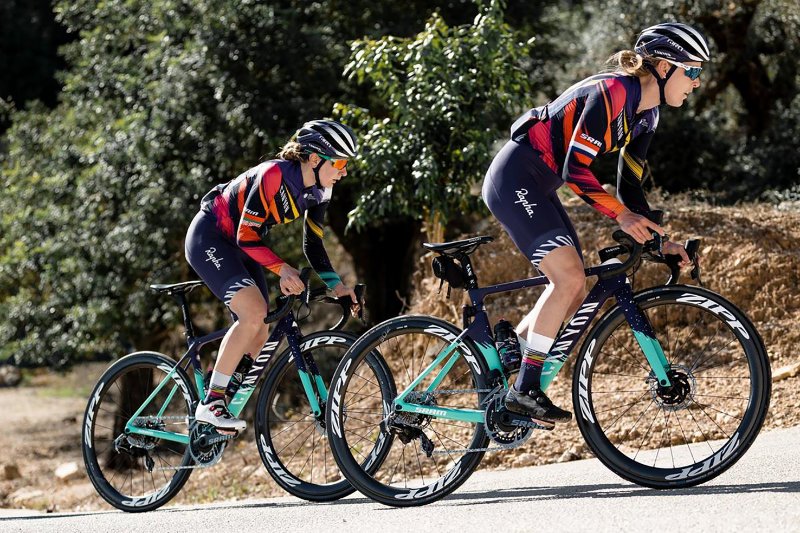
Caption: Customisation, and personalisation have always been a big part of team sports, but with the advent of digital technologies this section of the marketplace is now also available to all.
The primary focus has been on comfort, and the development of the core textiles utilised to enhance the thermo regulation of the rider in order to increase performance. Keeping the body at an optimal temperature, alongside moisture management and heat regulation whilst remaining comfortable is key. Aerodynamics also play a huge role in professional cycling, and the fabric utilised, the weave (surface texture) or knit and fibre compositions are critical.
Sustainability is one of the pillars for Rapha, as a baseline, and its embedded into the company’s DNA. The product team constantly strive to reduce the environmental impact of their apparel, focussing on the footprint of the raw materials, whilst also making a huge effort to refine the reliability and the quality of recycled materials which are essential for circular design. The team are researching bio-based alternatives, and continually try to move away from petroleum-based fibres. As research continues, new developments are trialled and once these new fibres are available for mainstream production, they will be incorporated into the Rapha garments.
Rapha have a longstanding relationship with many of their core suppliers, commerce that’s built on trust and collaboration, and it’s this foundation that gives them good visibility and transparency.
Customisation, and personalisation have always been a big part of team sports, but with the advent of digital technologies this section of the marketplace is now also available to all. Cycling clubs can now order customised sportswear via the Rapha online customisation tool, each order is verified and checked by the product team before manufacture to ensure exceptional customer service. Utilising software for design has become a large part of the design process, for both core and customised garments, saving time on expensive sampling, whilst shortening the design time and the requirement of prototypes from the manufacturer.
Utilising the EFI-Optitex software this design process can now be accelerated, with both visual data and technical data utilised in real-time via 3D modelling, the performance of the garment, its design style and textile performance can be tested for comfort, stretch and tension reducing the requirement of a physical sample.

Caption: Born from a love of the sport, Rapha isn’t simply a cycling brand, it’s a community and regularly organises and sponsors unique rides and events.
The consumer can also upload their own artwork and see a visualisation of the product to further reduce the need for sampling and Rapha offers an online service for ecommerce sales.
Alongside design, data management is a huge part of the digitisation process. Rapha work with many manufacturers, the data stream is a valuable asset and saves time and waste within the manufacturing workflow. Once the products are designed, the workflow remains digital (in the majority of cases) for the remainder of the journey to the consumer.
Pattern cutting, nesting, grading and marker making is all digital. The files are created in the Rapha studio or whilst working with manufacturers, project by project, all which will be delivered in a digital format for production. Digital print technology using dye sublimation forms the print process, in some instances that’s roll to roll and others flat-bed transfer printing. The cutting for all garments is also automated using lazer cutting technology.
Rapha have a vision to make cycling the most popular sport in the world. Their products are designed to create the ultimate riding experience, and in nurturing the next generation, by investing via their grass roots foundations alongside the dedicated cyclist, the brand has built a worldwide cult following.
To listen to the FESPA Podcast with John Roberts and Carl Moriarty, please follow this link.
Interested in joining our community?
Enquire today about joining your local FESPA Association or FESPA Direct
Recent news
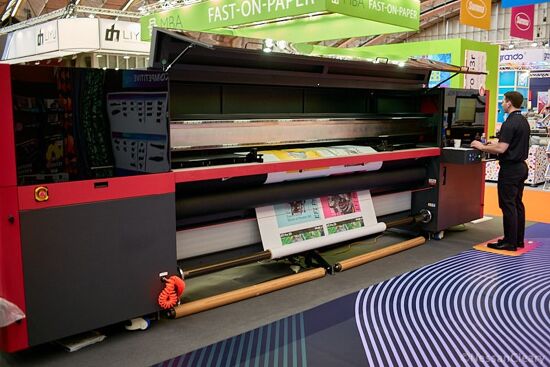
Are analytics services worthwhile for wide format printing?
Nessan Cleary shares how press manufacturers are increasingly offering machine analytics services and shares if these are good value for money in the wide format sector.
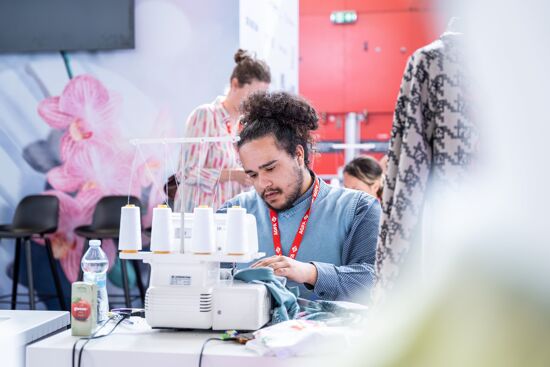
Smart factories and customisation technology explored at Personalise Make Wear 2024
FESPA's Textile Ambassador, Debbie McKeegan speaks to industry specialists at Personalise Make Wear at Personalisation Experience and Sportswear Pro 2024 held in Amsterdam. Each day of the exhibitions Debbie hosted a fire-side chat with these specialists to discuss various industry topics. During this Fire-side chat with Antigro, Caldera, Print Logistics, Inkcups and Kornit Digital they discuss the role of digital technologies in personalisation, reshaping the supply chain, the future of manufacturing and more.

The pros and cons of Digital Signage and Printed Signage
Sonja Angerer discusses the pros and cons of both digital signage and printed signage. Current developments such as artificial intelligence and spatial computing are changing the situation once again. How will this shift affect printers?
